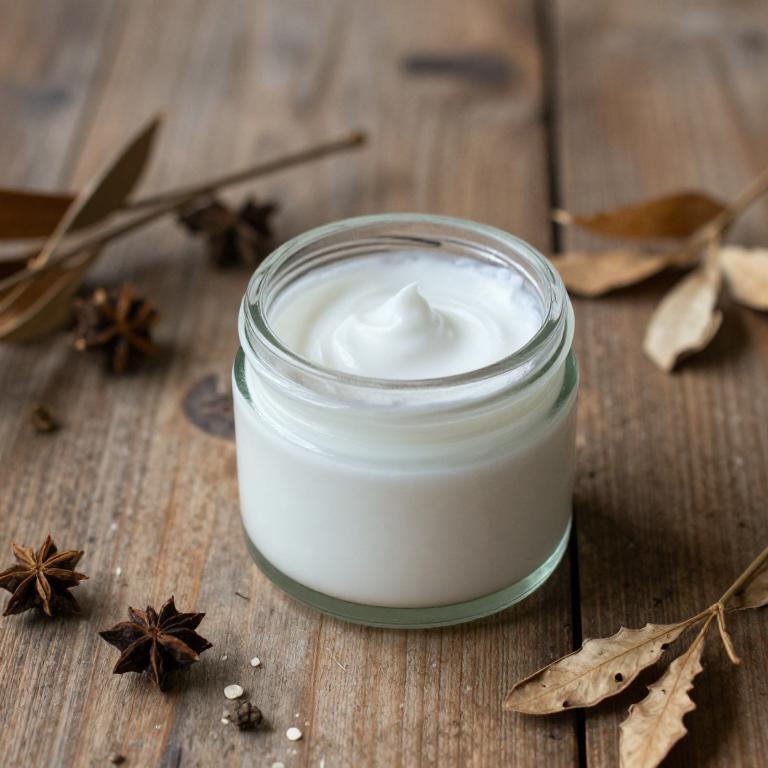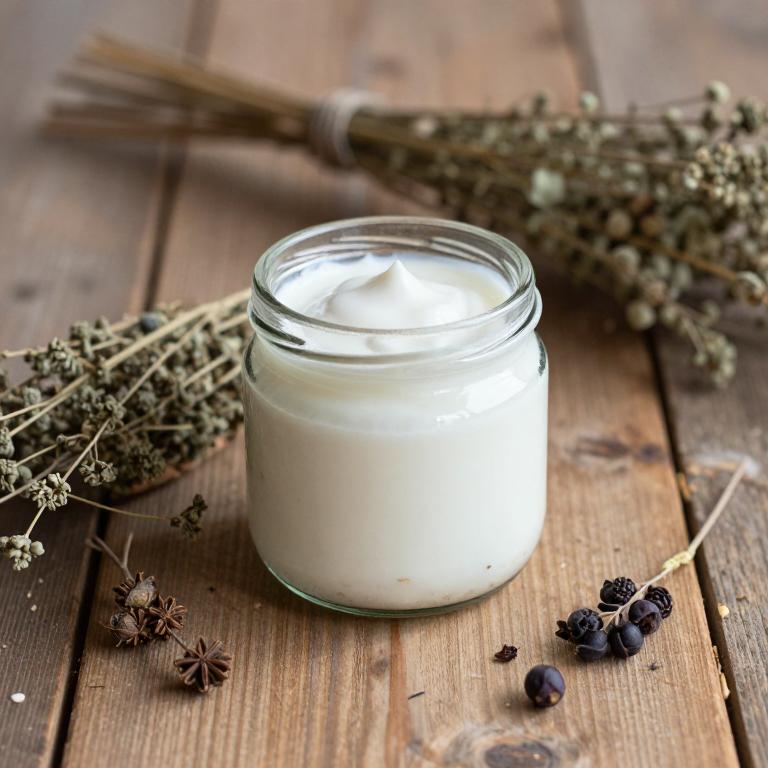10 Best Herbal Creams For Gum Infection

Herbal creams for gum infection are natural topical treatments that incorporate plant-based ingredients known for their antimicrobial and anti-inflammatory properties.
These creams often contain herbs like tea tree oil, neem, and clove, which have been traditionally used to soothe gum inflammation and reduce bacterial growth. They are generally considered safe for most individuals, though they may not be a substitute for professional dental care in severe cases. Regular use of herbal creams can help alleviate symptoms such as redness, swelling, and bleeding gums.
However, it is important to consult a dentist for a comprehensive treatment plan if the infection persists or worsens.
Table of Contents
- 1. Salvia (Salvia officinalis)
- 2. Aloe vera (Aloe barbadensis)
- 3. Ginger (Zingiber officinale)
- 4. Echinacea (Echinacea purpurea)
- 5. Ceylon cinnamon (Cinnamomum zeylanicum)
- 6. Stinging nettle (Urtica dioica)
- 7. Rosemary (Rosmarinus officinalis)
- 8. Chaste tree (Vitex agnus-castus)
- 9. Bloodroot (Sanguinaria canadensis)
- 10. Oregano (Origanum vulgare)
1. Salvia (Salvia officinalis)

Salvia officinalis, commonly known as sage, is a herbal plant that has been traditionally used for its anti-inflammatory and antimicrobial properties.
Herbal creams containing salvia officinalis can be beneficial for treating gum infections due to their ability to reduce inflammation and inhibit the growth of harmful bacteria. These creams often combine sage extract with other natural ingredients like tea tree oil or calendula to enhance their therapeutic effects. When applied topically to the gums, they can help soothe irritation and promote healing.
However, it is important to consult a dentist or healthcare professional before using any herbal remedies, especially if the infection is severe or persistent.
2. Aloe vera (Aloe barbadensis)

Aloe barbadensis, commonly known as aloe vera, has been widely recognized for its soothing and healing properties, making it a popular ingredient in herbal creams used for gum infections.
These creams often contain aloe vera gel, which has anti-inflammatory and antimicrobial properties that can help reduce swelling, redness, and bacterial growth in the gums. The cooling effect of aloe vera provides immediate relief from gum irritation and discomfort, promoting a sense of comfort during the healing process. Additionally, aloe-based creams may support tissue repair and regeneration, aiding in the recovery of damaged gum tissue.
When used as part of a holistic oral care routine, aloe barbadensis herbal creams can complement traditional treatments for gum infections, offering a natural and gentle alternative for those seeking to manage their symptoms.
3. Ginger (Zingiber officinale)

Zingiber officinale, commonly known as ginger, has been traditionally used for its anti-inflammatory and antimicrobial properties, making it a valuable ingredient in herbal creams for gum infections.
These creams often incorporate ginger extract to help reduce inflammation, swelling, and bacterial buildup in the gums, which are common symptoms of gingivitis and periodontal disease. The active compounds in ginger, such as gingerol and shogaol, have shown potential in inhibiting the growth of harmful oral bacteria. When applied topically, ginger-based creams can provide soothing relief and support the healing process of infected gums.
However, it is important to consult a dentist for proper diagnosis and treatment, as herbal remedies should complement, not replace, professional dental care.
4. Echinacea (Echinacea purpurea)

Echinacea purpurea, commonly known as purple coneflower, is a traditional herbal remedy often used for its potential anti-inflammatory and antimicrobial properties.
When incorporated into herbal creams, echinacea purpurea may help reduce inflammation and combat bacterial growth in cases of gum infection. These creams are typically formulated with other natural ingredients to enhance their effectiveness and promote healing of the gums. While some studies suggest that echinacea may support immune response, more research is needed to confirm its efficacy specifically for gum infections.
As with any herbal treatment, it is advisable to consult a healthcare professional before use, especially if you have existing health conditions or are taking other medications.
5. Ceylon cinnamon (Cinnamomum zeylanicum)

Cinnamomum zeylanicum, commonly known as cinnamon, is often used in herbal creams for its antimicrobial and anti-inflammatory properties that can help treat gum infections.
These creams typically contain essential oils extracted from the bark of the cinnamon tree, which have been shown to inhibit the growth of bacteria like Porphyromonas gingivalis that contribute to periodontal disease. The warming effect of cinnamon in topical applications can also help reduce swelling and discomfort in inflamed gums. When applied regularly, these herbal creams may support oral hygiene by promoting healing and preventing further infection.
However, it is advisable to consult a dentist or healthcare professional before using cinnamon-based products for gum issues, especially if there are existing dental conditions or allergies.
6. Stinging nettle (Urtica dioica)

Urtica dioica, commonly known as stinging nettle, has been traditionally used in herbal medicine for its anti-inflammatory and antimicrobial properties.
When formulated into creams, it can be applied topically to reduce swelling and redness associated with gum infections. The active compounds in Urtica dioica, such as flavonoids and alkaloids, help combat bacterial growth and promote tissue healing. However, it is important to consult a healthcare professional before using these creams, especially if you have known allergies or are undergoing other treatments.
While some studies suggest potential benefits, more clinical research is needed to fully establish the efficacy of Urtica dioica creams for gum infections.
7. Rosemary (Rosmarinus officinalis)

Rosmarinus officinalis, commonly known as rosemary, is a medicinal herb that has been traditionally used for its antimicrobial and anti-inflammatory properties.
Rosemary essential oil, derived from the plant, is often incorporated into herbal creams designed to alleviate symptoms of gum infections, such as inflammation, swelling, and bacterial buildup. These creams may help reduce plaque and gingivitis by inhibiting the growth of harmful oral bacteria. The natural compounds in rosemary, such as rosmarinic acid, contribute to its soothing and healing effects on the gums.
While herbal creams can be a complementary treatment, they should not replace professional dental care for persistent or severe gum infections.
8. Chaste tree (Vitex agnus-castus)

Vitex agnus-castus, commonly known as chasteberry, has been traditionally used in herbal medicine for its potential anti-inflammatory and antimicrobial properties.
When incorporated into herbal creams, it may help reduce inflammation and soothe infected gum tissues. These creams are often used as a complementary treatment for gum infections, particularly in cases where conventional treatments are not preferred or effective. The essential oils and phytochemicals in vitex agnus-castus may inhibit the growth of bacteria that contribute to periodontal disease.
However, it is important to consult with a healthcare professional before using such creams, as they may interact with other medications or have contraindications for certain individuals.
9. Bloodroot (Sanguinaria canadensis)

Sanguinaria canadensis, also known as bloodroot, has been traditionally used in herbal medicine for its antimicrobial and anti-inflammatory properties.
When incorporated into herbal creams, it may help alleviate symptoms of gum infections by reducing bacterial growth and inflammation in the oral cavity. These creams often combine bloodroot with other natural ingredients like tea tree oil or calendula to enhance their healing effects. However, it is important to note that while some studies suggest potential benefits, more clinical research is needed to confirm their efficacy and safety for long-term use.
As with any herbal remedy, it is advisable to consult a healthcare professional before using bloodroot-based creams for gum infections.
10. Oregano (Origanum vulgare)

Origanum vulgare, commonly known as oregano, is a potent herbal remedy often used in the formulation of herbal creams for gum infections due to its strong antimicrobial and anti-inflammatory properties.
These creams typically contain essential oils extracted from the leaves of the plant, which are known to combat bacteria that cause gum disease, such as Porphyromonas gingivalis. The application of oregano-based creams can help reduce swelling, redness, and pain associated with gingivitis and periodontitis. Additionally, the natural compounds in oregano, such as carvacrol and thymol, contribute to its effectiveness in promoting oral health and healing.
When used as part of a holistic dental care routine, these herbal creams may offer a natural alternative for managing gum infections.